Scott Walker (Wisconsin governor)
Scott Walker (Republican Party) was the Governor of Wisconsin. He assumed office in 2011. He left office in 2019.
Walker (Republican Party) ran for re-election for Governor of Wisconsin. He lost in the general election on November 6, 2018.
He ran on a joint ticket with the former lieutenant governor, Rebecca Kleefisch (R). He was first elected to the position in 2010.
On July 13, 2015, Walker announced that he was running for President of the United States in 2016.[1] Walker suspended his campaign on September 21, 2015.[2]
Walker served in the Wisconsin State Assembly from 1993 to 2002 and as Milwaukee County executive from 2002 to 2010.[3][4]
Biography
Born in Colorado Springs, Colorado, to Pat and Llewlyn Walker, Scott Walker first moved to Plainfield, Iowa, before settling in the small town of Delevan, Wisconsin, in 1977. Growing up, Walker was an active Boy Scout and earned the rank of Eagle Scout. When he served as governor, Walker continued to be involved with scouting. Through the American Legion, he also went to Ripon, Wisconsin, for Badger Boys State and then to Washington, D.C., for Boys Nation.[5] Walker credited that experience with sparking his interest in politics.
Walker left Marquette University in his senior year to join the Red Cross in a marketing position. He also worked briefly for IBM while he was a student at Marquette.[5] Having never returned to finish his degree, Walker was the first governor in over 64 years not to hold a college degree.
In 1993, Walker ran for and was elected to the Wisconsin State Assembly in a special election for the 14th District.[5] He was re-elected four times and served nine years in the Assembly.[5]
Walker ran for Milwaukee County executive in 2002 and won a special election that year after former county executive Tom Ament resigned.[3][5] Walker was re-elected as county executive for Wisconsin's largest county in 2004 and 2008.[5] In his 2008 re-election bid, Walker won over 57% of the vote.[6] Walker officially stepped down as county executive on December 28, 2010, shortly after being elected the 45th governor of Wisconsin.[3][4]
He previously ran for governor in 2006 but ended his candidacy over fundraising concerns. In April 2009, he announced his second run for governor.[7]
Bildung
- High school diploma, Delevan-Darien High School (1986)
- Attended, Marquette University (1986 to 1990)
Political career
Governor of Wisconsin (2011 - 2019)
In both the 2010 primary and general election, Walker campaigned on a program of cutting spending, reversing taxes, and reducing salaries and benefits for public sector union employees.[8] He promised to decline a proposed $800 million federal grant to build a rail line between Madison and Milwaukee, saying the annual upkeep would outpace federal government aid and be too expensive to make the project worthwhile.[9] After his victory in 2010, the grant was rescinded and the money given to other states. Walker avoided recall by winning an election in 2012 and won a second four-year term in 2014.
County Executive of Milwaukee (2002 - 2010)
Walker was first elected to the county executive's office in a special election to replace a county executive who left office after he was targeted for recall due to a controversial pension deal. Walker went on to win re-election twice, with 57% of the vote in 2004 and 59% in 2008.[10][11][12][13][14]
Wisconsin State Legislature (1993 - 2002)
In 1993, Walker ran for and was elected to the Wisconsin State Assembly in a special election for the 14th District.[5] He was re-elected four times and served nine years in the Assembly.[5]
During his four terms as a state legislator, Walker emphasized reducing crime, decreasing welfare programs, and opposing abortion.[15]
Walker also authored a bill that ended the practice of reducing prisoners' sentences for good behavior.[14]
Presidential preference
2016 presidential endorsement
✓ Walker endorsed Ted Cruz for the Republican primary in the 2016 U.S. presidential election.[16]
- See also: Endorsements for Ted Cruz
Possible 2016 Republican vice presidential candidate
- See also: Possible vice presidential picks, 2016
Walker was mentioned in 2016 as a possible Republican vice presidential candidate. Click here for the full list of those who were floated by politicians and news outlets as possible running mates.
Elections
2018
General election
General election for Governor of Wisconsin
The following candidates ran in the general election for Governor of Wisconsin on November 6, 2018.
Candidate | % | Votes | ||
| ✔ |  | Tony Evers (D) | 49.5 | 1,324,307 |
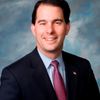 | Scott Walker (R) | 48.4 | 1,295,080 | |
 | Phillip Anderson (L) | 0.8 | 20,225 | |
 | Maggie Turnbull (Independent) | 0.7 | 18,884 | |
 | Michael White (G) | 0.4 | 11,087 | |
 | Arnie Enz (The Wisconsin Party) | 0.1 | 2,745 | |
| Other/Write-in votes | 0.0 | 980 | ||
| Total votes: 2,673,308 | ||||
 = candidate completed the Ballotpedia Candidate Connection survey. = candidate completed the Ballotpedia Candidate Connection survey. | ||||
| If you are a candidate and would like to tell readers and voters more about why they should vote for you, complete the Ballotpedia Candidate Connection Survey. | ||||
Do you want a spreadsheet of this type of data? Contact our sales team. | ||||
Democratic primary election
Democratic primary for Governor of Wisconsin
The following candidates ran in the Democratic primary for Governor of Wisconsin on August 14, 2018.
Candidate | % | Votes | ||
| ✔ |  | Tony Evers | 41.8 | 225,082 |
 | Mahlon Mitchell | 16.3 | 87,926 | |
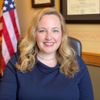 | Kelda Roys | 12.8 | 69,086 | |
 | Kathleen Vinehout | 8.2 | 44,168 | |
 | Michael McCabe | 7.4 | 39,885 | |
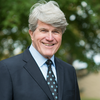 | Matthew Flynn | 5.9 | 31,580 | |
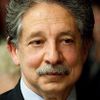 | Paul Soglin | 5.2 | 28,158 | |
 | Andy Gronik | 1.2 | 6,627 | |
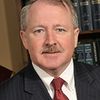 | Dana Wachs | 0.8 | 4,216 | |
 | Josh Pade | 0.4 | 1,908 | |
| Total votes: 538,636 | ||||
 = candidate completed the Ballotpedia Candidate Connection survey. = candidate completed the Ballotpedia Candidate Connection survey. | ||||
| If you are a candidate and would like to tell readers and voters more about why they should vote for you, complete the Ballotpedia Candidate Connection Survey. | ||||
Do you want a spreadsheet of this type of data? Contact our sales team. | ||||
Withdrawn or disqualified candidates
- Bob Harlow (D)
- Michele Doolan (D)
- Andrew Lust (D)
- Jeff Rumbaugh (D)
- Ramona Whiteaker (D)
- Mike Crute (D)
Republican primary election
Republican primary for Governor of Wisconsin
Incumbent Scott Walker defeated Robert Meyer in the Republican primary for Governor of Wisconsin on August 14, 2018.
Candidate | % | Votes | ||
| ✔ |  | Scott Walker | 91.6 | 417,276 |
 | Robert Meyer | 8.4 | 38,269 | |
| Total votes: 455,545 | ||||
 = candidate completed the Ballotpedia Candidate Connection survey. = candidate completed the Ballotpedia Candidate Connection survey. | ||||
| If you are a candidate and would like to tell readers and voters more about why they should vote for you, complete the Ballotpedia Candidate Connection Survey. | ||||
Do you want a spreadsheet of this type of data? Contact our sales team. | ||||
Withdrawn or disqualified candidates
- Ryan Cason (R)
Green primary election
Green primary for Governor of Wisconsin
Michael White advanced from the Green primary for Governor of Wisconsin on August 14, 2018.
Candidate | % | Votes | ||
| ✔ |  | Michael White | 100.0 | 817 |
| Total votes: 817 | ||||
 = candidate completed the Ballotpedia Candidate Connection survey. = candidate completed the Ballotpedia Candidate Connection survey. | ||||
| If you are a candidate and would like to tell readers and voters more about why they should vote for you, complete the Ballotpedia Candidate Connection Survey. | ||||
Do you want a spreadsheet of this type of data? Contact our sales team. | ||||
Libertarian primary election
Libertarian primary for Governor of Wisconsin
Phillip Anderson advanced from the Libertarian primary for Governor of Wisconsin on August 14, 2018.
Candidate | % | Votes | ||
| ✔ |  | Phillip Anderson | 100.0 | 1,673 |
| Total votes: 1,673 | ||||
 = candidate completed the Ballotpedia Candidate Connection survey. = candidate completed the Ballotpedia Candidate Connection survey. | ||||
| If you are a candidate and would like to tell readers and voters more about why they should vote for you, complete the Ballotpedia Candidate Connection Survey. | ||||
Do you want a spreadsheet of this type of data? Contact our sales team. | ||||
2016
Presidency
| Scott Walker withdraws from the 2016 presidential race, September 21, 2015 |
On July 13, 2015, Walker announced that he was running for president of the United States in 2016.[17] Walker experienced a decline in polling support during September 2015, which caused his campaign to struggle financially. According to Ballotpedia's Insiders Poll after the September 2015 CNN debate, 1% of Republican insiders considered Walker to be the biggest winner of the night. A CNN/ORC survey conducted in the three days following the September 16, 2015, Republican debate showed that Walker had less than 0.5% support, and a Quinnipiac poll from September 11, 2015, showed that he registered 3% support, a 15-point drop from when he topped Quinnipiac’s survey in July 2015 with 18% support. In his announcement, Walker said he was withdrawing in order to clear the field and allow voters to assess a smaller field of candidates with more care. He encouraged other Republican candidates to consider doing the same.[18][19][20]
2014
- See also: Wisconsin gubernatorial election, 2014
| Governor and Lieutenant Governor of Wisconsin, 2014 | ||||
|---|---|---|---|---|
| Party | Candidate | Vote % | Votes | |
| Republican | 52.3% | 1,259,706 | ||
| Democrat | Mary Burke/John Lehman | 46.6% | 1,122,913 | |
| Libertarian | Robert Burke/Joseph Brost | 0.8% | 18,720 | |
| Independent | Dennis Fehr | 0.3% | 7,530 | |
| Nonpartisan | Scattering | 0.1% | 1,248 | |
| Nonpartisan | Write-in votes | 0% | 200 | |
| Total Votes | 2,410,317 | |||
| Election results via Wisconsin Government Accountability Board | ||||
2012
- See also: Scott Walker recall, Wisconsin (2012)
| Recall of Wisconsin Governor Scott Walker, 2012 | ||||
|---|---|---|---|---|
| Party | Candidate | Vote % | Votes | |
| Republican | 53.1% | 1,335,585 | ||
| Democratic | Tom Barrett | 46.3% | 1,164,480 | |
| Independent | Hari Trivedi | 0.6% | 14,463 | |
| Scattering | - | 0.1% | 1,537 | |
| Total Votes | 2,516,065 | |||
| Election results via Wisconsin Government Accountability Board | ||||
| Wisconsin Governor Recall - Republican Primary, 2012 | ||||
|---|---|---|---|---|
| Candidate | Vote % | Votes | ||
| 96.9% | 626,962 | |||
| Arthur Kohl-Riggs | 3.1% | 19,939 | ||
| Patrick J. O'Brien (Write-In) | 0% | 17 | ||
| Scattering | 0% | 204 | ||
| Total Votes | 647,122 | |||
| Election results via Wisconsin Government Accountability Board. | ||||
2010
- See also: Wisconsin gubernatorial election, 2010
| Wisconsin Governor/Lt. Governor, 2010 | ||||
|---|---|---|---|---|
| Party | Candidate | Vote % | Votes | |
| Republican | 52.2% | 1,128,941 | ||
| Democratic | Tom Barrett/Tom Nelson | 46.5% | 1,004,303 | |
| Independent | Jim Langer/No candidate | 0.5% | 10,608 | |
| Libertarian | No candidate/Terry Virgil | 0.3% | 6,790 | |
| Common Sense | James James/No candidate | 0.4% | 8,273 | |
| Independent | Leslie Ervin Smetak/David Myron Smetak | 0% | 19 | |
| Independent | Patricia Messici/No candidate | 0% | 22 | |
| Independent | Hari Trivedi/No candidate | 0% | 18 | |
| - | Scattering | 0.1% | 1,858 | |
| Total Votes | 2,160,832 | |||
| Election results via Wisconsin Government Accountability Board | ||||
2008
| 2008 Milwaukee County Executive Election Results[21]. | ||||
|---|---|---|---|---|
| Candidates | Prozentualer Anteil | |||
| Scott Walker | 57.74% | |||
| Lena Taylor | 40.40% | |||
| Scattering | 0.17% | |||
| Total votes | 170,251 | |||
NOTE: County Executive candidates are listed as nonpartisan.
Campaign themes
2018
Campaign website
Walker's campaign website stated the following:
| " |
Jobs and Developing the Workforce During the four years before we took office, Wisconsin was headed backward with the loss of 133,000 jobs and an unemployment rate that peaked at 9.3 percent. In fact, Wisconsin was in the Bottom 10 for business according to Chief Executive Magazine. Today, Wisconsin’s economy is strong and moving forward. Wisconsin is now ranked as one of the top states for business. The unemployment rate hit an all-time low in 2018 and more people are working than ever before in Wisconsin – over 3 million. To help Wisconsin win the 21st century, stay ahead of the curve and ensure long-term prosperity, we have enacted a comprehensive plan to develop our workforce. Targeted investments in our schools help students start thinking about their career choices as early as 6th grade. Investments in Dual Enrollment programs will help students achieve credit for high school graduation and get a head start on the associate or bachelor’s degree that is right for them. The Wisconsin Fast Forward program provides customized worker training in high-demand areas to help fill our workforce needs. And the state has a new labor management information system to track employment needs by region, helping to direct resources to meet specific workforce demands. Investments in workforce development, lower taxes, reasonable regulations, Right to Work: all of these contribute to a better climate for creating jobs and opportunity. We will continue to move Wisconsin forward with more bold reforms that help the private sector succeed while keeping taxpayers in charge. Cutting Taxes In the decade before taking office, property taxes increased by 27 percent. Thanks to our bold conservative reforms, property taxes will be lower in 2018 than they were in both 2014 and 2010. We even eliminated an entire tax as part of our pledge to keep taxpayers first. Income taxes will also be lower in 2018 than they were in 2010. This income tax relief helps hard-working families stay ahead and small businesses thrive. We have gone further by virtually eliminating taxes on core Wisconsin industries like manufacturing and agriculture. We even eliminated the tax on health savings accounts. We believe that you do a better job of spending your hard-earned money than the government does. Looking ahead, we will continue to hold the line on taxes because keeping more money in the hands of taxpayers will help Wisconsin win the 21st century by creating more jobs and leading to higher wages. Education and Investing in Our Future Thanks to our Reform Dividend, we can invest in our priorities. In fact, our recent budget makes a historic investment in our schools — $200 more per student this past school year and $204 more per student in the fall, more actual dollars than ever before. With our Act 10 reforms in place, these funds are more likely to be spent in the classroom and help our children receive the education needed for a bright future. Our rural schools face unique challenges, especially as it relates to enrollment and transportation. That’s why we increased investments in Sparsity Aid to help ensure our children have access to a great education, no matter their zip code. Wisconsin is in the Top 10 for high school graduation rates and ACT scores, and these historic investments will continue to bolster student success. My sons, Matt and Alex, went to great public schools in Wauwatosa – as did I in Delavan. Every family deserves access to a great education for their children at the public, charter, choice, private, virtual or home school that is right for them. To keep the cost of college affordable for students and working families, we froze tuition at all University of Wisconsin campuses six years in a row – the first multi-year tuition freeze in UW history. Needs-based financial assistance is also at an all-time high. The UW has more than $1 billion in academic research and development, and the overall UW System budget is the largest it has ever been, meaning university resources can be used on priorities in the classroom. And the latest state budget makes a significant investment in higher education so we can focus on more graduates filling high demand positions in our state, and help everyone in Wisconsin win the 21st century As we continue moving Wisconsin forward, we are focused on finding ways to help students get a head start on higher education credits for our technical colleges, University of Wisconsin campuses and all other in-state colleges and universities. Backing Wisconsin's Small Businesses First, reduce business costs through lower taxes, stopping unemployment fraud, streamlining regulations and reducing frivolous lawsuits. Second, prepare the workforce through investing in K-12 education, increasing worker training, expanding opportunities in our technical colleges and strengthening ties between the University of Wisconsin system and the workforce. Third, end the public assistance benefits cliff, require able-bodied adults to work or receive employability training — and be able to pass a drug test before receiving public assistance — and target specific populations to enter the workforce. Fourth, market workforce opportunities within Wisconsin and recruit talent to the state from across the country and around the world. Standing Up for Rural Wisconsin With our conservative reforms in action, we’ve lowered property taxes, eliminated almost all the taxable liability on agricultural production, streamlined regulations, reduced frivolous lawsuits and promoted agricultural exports. Standing with Wisconsin’s dairy farmers, Gov. Walker created the Wisconsin Dairy Task Force 2.0 that will allow industry experts to work together to create real solutions that can help our farmers, processors, and allied organizations. We also increased assistance for rural schools, and our record investment in K-12 classrooms will help children across the state. Knowing that access to high-speed broadband internet is crucial to growing our economy and teaching our children, we’ve launched a rural broadband initiative and tripled grants for broadband in rural areas. To help everyone in Wisconsin win the 21st century, we are investing in our rural communities and fighting for the agriculture industry that is crucial to our economy. Preserving Our Heritage As Governor, I take an oath to uphold our federal and state constitutions. At the federal level, the Founders clearly defined our Second Amendment right to keep and bear arms. And at the state level, I voted to amend our state Constitution to include similar language. During my time as Governor, I’ve signed into law concealed carry and castle doctrine legislation. Both of these reforms help law-abiding citizens protect themselves and their property. I am honored to have an “A+” rating from the National Rifle Association for my record of standing up for freedom and our constitutional rights. The Wisconsin Walleye Initiative is one of our big successes for those who enjoy fishing in our 15,000 inland lakes. We also improved ways to get more young people involved in our hunting and fishing heritage. Standing for Life As Governor, I’ve had the honor of signing into law several pro-life priorities. We defunded Planned Parenthood and directed the resources to non-controversial women’s health programs. We also require an ultrasound to see an unborn child, and we protect an unborn baby at the time when they can feel pain. We want to make it easier for adoptive parents to provide a great family for children, which is why I have also signed several laws to improve the adoption process. Serving Our Veterans We fully restored the Wisconsin GI Bill so that our Veterans and their families can attend a public higher education institution for free. And we do not tax military pensions. Since we designated the Year of the Veteran to focus on employment of our Veterans, we have expanded our efforts. During our time in office, the unemployment rate for Veterans in Wisconsin fell to one of the lowest rates in the country. We will continue to build on our successful efforts to employ more Veterans. We will also continue to strengthen the state facilities for aging Veterans and their families, as well as those with special needs. During my time in office, we opened a new Veterans home in northwestern Wisconsin. Post-traumatic stress disorder and traumatic head injuries are major challenges for returning Veterans. We are working with the federal government, local governments and healthcare systems to improve care for our Veterans in these areas. We want every returning Veteran to have a place to call home, a job they want, good health and high quality of life. Keeping Health Care Affordable After Washington failed to get the job done and repeal Obamacare, we took action to lower premiums for Wisconsin families. By signing our bipartisan Health Care Stability Plan into law, we’re investing $200 million in market-based solutions to help bring down costs. In addition, we are working to guarantee coverage for individuals with preexisting conditions in an effort to provide the care they need, regardless of what happens in Washington. We also requested a permanent waiver for Wisconsin to provide SeniorCare – a program to help make prescription drugs more affordable for seniors. Under our plan, Obamacare costs will drop three and half percent in 2019 for Wisconsin families. By enacting a comprehensive plan to provide our families the care they need to live a healthy life, Wisconsin is ahead of the curve. In fact, after embracing a plan similar to ours, Minnesota’s premiums dropped as well. Our efforts to lower premiums, increase choice and provide certainty to seniors and those with preexisting conditions through our Health Care Stability Plan will make health care affordable for Wisconsin families.[22] |
” |
| —Friends of Scott Walker[23] | ||
Campaign advertisements
The following is an example of an ad from Walker's 2018 election campaign.
|
Campaign finance summary

2016 Republican National Convention
- See also: Republican National Convention, 2016
Walker was an at-large delegate to the 2016 Republican National Convention from Wisconsin. Walker was one of 36 delegates from Wisconsin bound by state party rules to support Ted Cruz at the convention.[24] Cruz suspended his campaign on May 3, 2016. At the time, he had approximately 546 bound delegates. For more on what happened to his delegates, see this page.
Delegate rules
At-large delegates from Wisconsin to the Republican National Convention were selected by a committee formed by the candidate who received a plurality of the statewide vote in the state presidential primary election and ratified by the State Executive Committee. For district-level delegates, the district chairman of each district compiled a list of delegates from which the presidential candidate who won a plurality of the vote in that district selected three delegates. Delegates from Wisconsin were bound to a candidate on all ballots at the convention unless the candidate released them or failed to receive one-third of the vote on a ballot.
Wisconsin primary results
- See also: Presidential election in Wisconsin, 2016
| Wisconsin Republican Primary, 2016 | ||||
|---|---|---|---|---|
| Candidate | Vote % | Votes | Delegates | |
|
|
48.2% | 531,129 | 36 | |
| Donald Trump | 35.1% | 386,290 | 6 | |
| John Kasich | 14.1% | 155,200 | 0 | |
| Jeb Bush | 0.3% | 3,156 | 0 | |
| Ben Carson | 0.5% | 5,608 | 0 | |
| Chris Christie | 0.1% | 1,310 | 0 | |
| Carly Fiorina | 0.1% | 825 | 0 | |
| Jim Gilmore | 0% | 242 | 0 | |
| Mike Huckabee | 0.1% | 1,428 | 0 | |
| Rand Paul | 0.2% | 2,491 | 0 | |
| Marco Rubio | 1% | 10,569 | 0 | |
| Rick Santorum | 0% | 510 | 0 | |
| Other | 0.2% | 2,288 | 0 | |
| Totals | 1,101,046 | 42 | ||
| Source: The New York Times and Wisconsin Vote | ||||
Delegate allocation
Wisconsin had 42 delegates at the 2016 Republican National Convention. Of this total, 24 were district-level delegates (three for each of the state's eight congressional districts). District delegates were allocated on a winner-take-all basis; the candidate who won a plurality of the vote in a congressional district received all of that district's delegates.[25][26]
Of the remaining 18 delegates, 15 served at large. Wisconsin's at-large delegates were allocated on a winner-take-all basis. The candidate who won a plurality of the statewide vote received all of the state's at-large delegates. In addition, three national party leaders (identified on the chart below as RNC delegates) served as bound delegates to the Republican National Convention.[25][26]
Noteworthy events
Wisconsin Government Accountability Board
On July 20, 2015, Walker announced that he wanted to eliminate the Wisconsin Government Accountability Board. The board was a nonpartisan agency of former judges established by the Wisconsin State Legislature in a January 2007 vote to enforce Wisconsin's state ethics, campaign finance, and election laws. When formed, the board assumed the duties previously held by the State Election Board and the State Ethics Board.[27][28][29]
In December 2015, Governor Walker signed a bill that eliminated the Government Accountability Board and overhauled the state's campaign finance laws. The law replaced the board with separate ethics and elections commissions.[30]
Stance on Syrian refugee resettlement
- Main article: U.S. governors and their responses to Syrian refugees
After the attacks in Paris, France, on November 13, 2015, many U.S. governors declared their support or opposition to Syrian refugee resettlement in their states. Walker expressed conditional opposition to the resettlement of Syrian refugees in the state of Wisconsin. He said:
| " | With this in mind, I am calling upon the President to immediately suspend the program pending a full review of its security and acceptance procedures. The State of Wisconsin will not accept new Syrian refugees. There may be those who will try to take advantage of the generosity of our country and the ability to move freely within our borders through this federal resettlement program, and we must ensure we are doing all we can to safeguard the security of Americans.[22] | ” |
| —Gov. Scott Walker[31] | ||
20-week abortion ban
On July 20, 2015, Gov. Walker signed a bill into law banning abortions after 20 weeks of pregnancy in the state of Wisconsin. In doing so, Wisconsin became the 16th state to prohibit most abortions at 20 weeks.[32]
Response to the 2014 illegal immigration surge
- See also: 2014 illegal immigration surge
On July 22, 2014, the Republican governors of Alabama, North Carolina, Pennsylvania, Utah, and Wisconsin sent a letter to President Obama (D) expressing concerns about how the administration was handling the increase in unaccompanied children crossing the U.S.-Mexico border between 2013 and 2014.[33] The governors argued that a failure to return the children to their home countries would “send a message that will encourage a much larger movement towards our southern border. We fear that this will put a significant number of children at risk of abuse and neglect on their journey to the United States.”[34]
September 2013 NYC event
Six of the Republican Party’s leaders and potential 2016 nominees jointly headlined a fundraiser for the Republican National Committee (RNC) in New York in September 2013.
According to an invitation that went out August 26, 2013, RNC Chairman Reince Priebus and Jets owner Woody Johnson hosted the event September 23, 2013, at Johnson's home.[35]
It was a dinner and reception with New Jersey Gov. Chris Christie, Senators Marco Rubio and Rand Paul, and Gov. Walker, as well as Michigan Gov. Rick Snyder and Rep. Paul Ryan, who were listed as special guests.[35]
Job creation ranking
A June 2013 analysis by The Business Journals ranked 45 governors based on the annual private sector growth rate in all 50 states using data from the U.S. Bureau of Labor Statistics. Walker was ranked number 40. The five governors omitted from the analysis all assumed office in 2013.[36][37]
Rejection of Medicaid expansion
Addressing a meeting of Wisconsin Manufacturers and Commerce on February 13, 2013, Walker announced his decision to reject Medicaid expansion through the federal healthcare law.
Under Walker's alternative plan, an enrollment cap on Medicaid programs for childless adults would be lifted, income eligibility for state residents able to use Medicaid programs would be tightened, and thousands of people in such programs would be moved to federal government-run healthcare exchanges, allowing them to purchase private insurance.[38]
Walker stated, "My goal in looking at this is two things: One, I want to have fewer people in the state who are uninsured, but along with that I'd like to have fewer people in the state who are dependent on the government."[38]
Walker became the 14th Republican governor to reject the Medicaid expansion.[39]
Tribal casinos
In 2013, the Seminole and Menominee tribes gained approval from the U.S. Bureau of Indian Affairs for an off-reservation casino in Kenosha, Wisconsin. Walker rejected an $800 million casino project in January 2015. Tribal leaders for the Potawatomi, Ho-Chunk, and Oneida opposed the Kenosha casino project, saying that it would cost their casinos millions of dollars in lost profits. Supporters of the casino project included Assembly Speaker Robin Vos (R) and Kenosha County Executive Jim Kreuser, who saw the project as a potential boost to the regional economy.[40][41]
John Doe investigations
Two John Doe investigations were launched by Milwaukee County District Attorney John Chisholm (D) into the activities of staff and associates of Gov. Walker.[42]
The first investigation, John Doe I, was launched after Walker aide Darlene Wink noticed funds were missing from the money raised by Operation Freedom, a charitable event for veterans that Walker hosted annually. Walker's office turned the case over to the Milwaukee County DA's office to investigate the missing funds.[43][42][44]
On May 5, 2010, Assistant District Attorney Bruce Landgraf asked for the authority to launch a John Doe investigation into the missing funds. He asked for the John Doe to determine where the funds had originated (i.e., sponsors and donors of the Operation Freedom Event). His request was granted by Judge Neal Nettesheim, who had been appointed the John Doe I judge.[42][45]
During the 2010 gubernatorial campaign, the John Doe investigation was expanded multiple times to include a Walker donor and members of Walker's county executive staff. The homes, offices, and cars of these people were searched, and property, such as computers and cell phones, was seized. The investigation lasted three years and resulted in the convictions of six people, four of whom weren’t related to the missing funds on which the investigation was predicated. The announcement of the charges against the six was made in January 2012, in the midst of an effort to recall Gov. Walker due to his support for Act 10.[46][47][48]
On June 5, 2012, the recall election attempting to remove Gov. Walker from office was held. Walker won re-election. In August 2012, the first John Doe investigation was rolled into a second investigation, John Doe II. This investigation was to see if Governor Walker’s campaign had illegally coordinated with conservative social welfare groups that had engaged in issue advocacy during the recall elections.[49][50]
The second John Doe investigation spanned multiple counties but was consolidated into one investigation, overseen by an appointed judge and one special prosecutor, Francis Schmitz. On October 3, 2013, investigators served search warrants on several homes and subpoenaed records from 29 conservative organizations. On October 25, 2013, three targets of the subpoenas filed a motion to have the subpoenas quashed. The judge overseeing the investigation, Judge Gregory Peterson, granted that motion in January 2014, stating that the prosecutor's theory of criminal activity was not criminal under Wisconsin statutes. Although Schmitz filed an appeal to a higher court, the investigation was effectively stalled.[51][52][53][54][55]
A series of lawsuits were filed, one against the John Doe prosecutors for a violation of free speech and several others against the agency that oversees campaign finance law, the Wisconsin Government Accountability Board, for trying to enforce unconstitutional regulations of issue advocacy groups, the regulations on which the prosecutor's theory was based.[56][57][53][58][59][60]
The legality of the investigation eventually went before the Wisconsin Supreme Court. On July 16, 2015, the supreme court ruled in a 4-2 decision to halt the John Doe II investigation. The court combined three cases into one, thereby simultaneously ruling on all three. In its ruling, the supreme court criticized Schmitz's handling of the case and declared Chisholm and Schmitz's actions to be violations of the targets' First Amendment rights to political speech.[61][62]
The supreme court, in interpreting Wisconsin's campaign finance law, ruled that "the definition of 'political purposes' [...] is unconstitutionally overbroad and vague under the First Amendment to the United States Constitution and Article 1, Section 3 of the Wisconsin Constitution because its language 'is so sweeping that its sanctions may be applied to constitutionally protected conduct which the state is not permitted to regulate.'"[61]
The court noted that since issue advocacy is "beyond the reach of Ch. 11," Schmitz's theory of illegal coordination between Walker's campaign and social welfare groups was invalid. The court further declared, "The special prosecutor's legal theory is unsupported in either reason or law," thereby ending the John Doe II investigation.[61]
Regarding the other two cases addressed in the ruling, the court denied Schmitz's supervisory writ and affirmed Peterson's original motion to quash the subpoenas. It also ruled that the John Doe II judges, Peterson and Barbara Kluka before him, had not violated proper procedure by allowing the appointment of one judge and one special prosecutor to preside over a multi-county John Doe.[61]
In its ruling, the court ordered that "everything gathered as potential evidence—including thousands of pages of emails and other documents—be returned and all copies be destroyed."[63][64]
Commission on Waste, Fraud and Abuse
Walker called for the formation of a Commission on Waste, Fraud and Abuse. The seven-member committee assembled in January 2011, and in July 2011 it identified $266,555,737 in potential annual savings for state agencies.
In their report, commission members said that state agencies had failed to control expenses in the wake of the recession.
“Wisconsin deserves a government that spends its financial resources just as carefully as the citizens of Wisconsin spend their own,” said Craig Rakowski, the commission’s chairman and president of James Craig Builders.[65] “Everyone has been forced to take a closer look at how they spend their money. Our state government should be no different.”[65]
Collective bargaining
One of Walker's early proposals, Wisconsin Assembly Bill 11, the "Scott Walker Budget Repair Bill", was aimed at reducing the ability of government employee unions to engage in collective bargaining. The proposal also called for union members to make contributions to their own medical insurance and retirement savings, of 12.6% and 5.8%, respectively.[66][67]
The bill was introduced into the state Assembly by the Committee on Assembly Organization, at the request of Walker, on February 15, 2011. It was then referred, successively, to the Joint Committee on Finance and the Joint Survey Committee on Retirement Systems. The Republican-controlled state Assembly and the state Senate were in favor of the bill; their Democratic colleagues took the opposite view. Lacking the numbers to vote the bill down, the entire Wisconsin Senate Democratic contingent refused to vote. Senate Republicans were one short of the 20 members needed to call a quorum and vote on spending bills, meaning the Democrats were able to halt a vote on the bill.
Walker ordered Wisconsin law enforcement to find the senators and compel them to return to the capitol for the vote; the Democratic Senate delegation in response went to a resort across the border in Rockford, Illinois.[68][69] In a February 17 press conference, Walker pressed lawmakers to return to the state and take a vote. Asked if he thought he had any legal authority to cross state lines and compel Senate Democrats to return to Madison, he told reporters, "That's a really big question for us."[70][71][72][73][74]
As the first week of protests ended, with Madison and Milwaukee schools having been closed three days, schools sought a temporary restraining order banning teachers from attending protests and thus forcing teachers to report to their jobs; the courts denied the request on Friday, February 18.[75][76][77]
Walker and Republican Party members continued to call for cutting collective bargaining rights, with Walker telling media outlets that he was doing exactly what he had promised during his campaign.[78] Walker warned public employees that he would commence layoffs if his bill continued to be stalled.[78]
Senate Republicans identified a way to end collective bargaining without Democratic cooperation. While the Wisconsin Senate must have a quorum to pass spending and fiscal bills, it could separate the collective bargaining from the spending cuts and pass the former item in its own bill.[79]
The Wisconsin Assembly voted for final passage of the bill on March 10, 2011, and Walker signed the bill into law the following day.[80]
Law struck down by district court
Dane County District Judge Maryann Sumi ruled in May 2011 that lawmakers violated Wisconsin's open meetings law in passing the collective bargaining legislation in spring 2011, and therefore, the bill would be null and void. Walker had signed the bill into law, but the ruling overruled it.
Sumi ruled that lawmakers failed to give enough notice for the Joint Committee on Conference meeting held March 9, 2011, during which lawmakers settled on the final version of the collective bargaining bill. The bill required most public union employees to contribute more to their healthcare and pension plans and limited their collective bargaining powers to salary negotiations.
Legislative leaders pledged to pass the legislation again as part of the biennial budget.[81]
Wisconsin Supreme Court overturns lower court ruling
On June 14, 2011, the Wisconsin Supreme Court overturned the lower court opinion, ruling that Walker’s collective bargaining law was in effect.
The ruling voided Dane County Circuit Court Judge Maryann Sumi’s decision striking down the law.
In its ruling, the state supreme court said that the Dane County Circuit Court had “invaded the legislature’s constitutional powers...under the Wisconsin Constitution” when Sumi issued a temporary restraining order preventing the law from going into effect.[82]
Personal
Note: Please contact us if the personal information below requires an update.
When he served as governor, Walker and his wife, Tonnette Walker, had two sons. The Walkers resided in Wauwatosa.[5]
Recent news
The link below is to the most recent stories in a Google news search for the terms Scott Walker Wisconsin Governor. These results are automatically generated from Google. Ballotpedia does not curate or endorse these articles.
See also
| Wisconsin | State Executive Elections | News and Analysis |
|---|---|---|
|
|
|
|
External links
- Social media:
- Biographies:
- Executive actions:
- Fact-checking:
- Interest group ratings:
- Issue positions:
- Public statements:
- Media appearances:
- Media coverage:
Footnotes
- ↑ NBC News, "Scott Walker, Wisconsin Governor, Says He Is Running for President," July 13, 2015
- ↑ New York Times, "Scott Walker Said to Be Quitting Run for President," September 21, 2015
- ↑ 3.0 3.1 3.2 National Governors Association, "Gov. Scott Walker," accessed June 15, 2021
- ↑ 4.0 4.1 Milwaukee Journal Sentinel, "Walker announces his last day as county exec will be Dec. 27," December 15, 2010
- ↑ 5.0 5.1 5.2 5.3 5.4 5.5 5.6 5.7 5.8 Scott Walker for Governor, "Official Biography," accessed October 27, 2010
- ↑ Milwaukee County Election Commission, "Spring 2008 General Election Results," accessed October 28, 2010
- ↑ Milwaukee Journal Sentinel, "Walker expected to announce gubernatorial bid April 28," April 20, 2009
- ↑ The Daily Reporter, "Walker targets wages and benefits," November 13, 2009
- ↑ Milwaukee Journal-Sentinel, "Walker says no thanks to federal stimulus dollars," January 6, 2009
- ↑ WISN.com, "Walker Wins Race For Milwaukee County Executive," April 6, 2014
- ↑ Milwaukee County, "April 6, 2004 Election Results," accessed February 18, 2011
- ↑ Milwaukee County, "April 1, 2008 Election Results," accessed February 18, 2011
- ↑ Milwaukee Journal Sentinel, "Walker would lower salary givebacks," March 19, 2008
- ↑ 14.0 14.1 NPR, "Election 2010: AP Election Guide," accessed July 25, 2014
- ↑ Wisconsin Right to Life, "About Scott Walker," accessed July 25, 2014
- ↑ Politico, "Scott Walker endorses Ted Cruz," March 29, 2016
- ↑ NBC News, "Scott Walker, Wisconsin Governor, Says He Is Running for President," July 13, 2015
- ↑ Politico, "Insiders: Scott Walker the biggest loser of the summer," September 4, 2015
- ↑ PBS Newshour, "Watch Live: Scott Walker to drop out of 2016 presidential race," September 21, 2015
- ↑ Washington Post, "Scott Walker suspends presidential campaign," September 21, 2015
- ↑ Milwaukee County Elections Commission, "2008 Spring Election Results," April 1, 2008
- ↑ 22.0 22.1 Note: This text is quoted verbatim from the original source. Any inconsistencies are attributable to the original source.
- ↑ Scott Walker for Governor, "Issues," accessed September 12, 2018
- ↑ Wisconsin State Journal, "Wisconsin GOP releases list of all 42 delegates to Republican National Convention," April 27, 2016
- ↑ 25.0 25.1 Republican National Committee, "2016 Presidential Nominating Process," accessed October 6, 2015
- ↑ 26.0 26.1 CNN.com, "Republican National Convention roll call vote," accessed July 20, 2016 Cite error: Invalid
<ref>tag; name "rollcallvote" defined multiple times with different content - ↑ The Washington Times, "Wisconsin nonpartisan elections board targeted for overhaul," accessed August 5, 2015
- ↑ The New York Times, "Scott Walker proposes shutting Wisconsin ethics board," accessed August 5, 2015
- ↑ Wisconsin State Journal, "Status quo likely won't last at Government Accountability Board, putting elections, ethics oversight in flux," accessed August 5, 2015
- ↑ Wisconsin Law Journal, "Walker signs law eliminating elections board; new panel will have 2 judges (UPDATE)," December 16, 2015
- ↑ Office of the Governor, "Governor Scott Walker Releases Statement on Federal Syrian Refugee Resettlement Program," November 16, 2015
- ↑ USA Today, "GOP presidential hopeful Walker signs abortion ban," July 21, 2015
- ↑ United States Customs and Border Protection, "DHS Secretary Jeh Johnson Visits the Rio Grande Valley," December 2, 2014
- ↑ Utah Governor Gary Herbert, "Gov. Herbert discusses undocumented unaccompanied minors on U.S. border," accessed July 10, 2018
- ↑ 35.0 35.1 Politico, "GOP 2016 hopefuls slated for NYC event," accessed August 28, 2013
- ↑ The Business Journals, "Governors and jobs: How governors rank for job creation in their states," June 27, 2013
- ↑ The Business Journals, "How state governors rank on their job-growth record," June 27, 2013
- ↑ 38.0 38.1 Wisconsin State Journal, "Scott Walker rejects Medicaid expansion, proposes alternate plan to cover uninsured," February 13, 2013
- ↑ Telegraph Herald, "Walker says no to federal Medicaid expansion," February 14, 2013
- ↑ The Washington Post, "Republican governors group benefitting big from Wisconsin casino fight," February 14, 2014
- ↑ Milwaukee Journal-Sentinel, "Scott Walker rejects Menominee bid for Kenosha casino," January 23, 2015
- ↑ 42.0 42.1 42.2 United States District Court for the Eastern District of Wisconsin Milwaukee Division, "Eric O’Keefe, and Wisconsin Club for Growth, Inc.," accessed February 23, 2015
- ↑ Free Republic, "Operation Freedom: Milwaukee County Zoo," July 1, 2005
- ↑ Milwaukee Journal Sentinel, "Authorities seize computer of Walker aide," August 23, 2010
- ↑ Say Anything Blog, "John Doe I judge says he’s not responsible for John Doe II," June 10, 2014
- ↑ Milwaukee Journal Sentinel, "Walker appointees charged in John Doe investigation," January 6, 2012
- ↑ Wisconsin State Journal, "New charges in John Doe investigation allege pattern of illegal fundraising among Walker aides," January 27, 2012
- ↑ Milwaukee Journal Sentinel, "Walker recall effort kicks off," November 15, 2011
- ↑ Wisconsin Government Accountability Board, "Canvass Results for 2012 JUNE 5 RECALL ELECTION," accessed July 2, 2015
- ↑ United States District Court Eastern District of Wisconsin (Milwaukee), "O'Keefe et al v. Schmitz et al," February 10, 2014
- ↑ United States Court of Appeals for the 7th Circuit, "ERIC O’KEEFE, et al., v. JOHN T. CHISHOLM, et al.," accessed July 19, 2015
- ↑ Wall Street Journal, "Wisconsin Political Speech Raid," November 18, 2013
- ↑ 53.0 53.1 State of Wisconsin Circuit Court Waukesha County, "ERIC O’KEEFE, and WISCONSIN CLUB FOR GROWTH, INC. v. WISCONSIN GOVERNMENT ACCOUNTABILITY BOARD, and KEVIN J. KENNEDY," accessed July 19, 2015
- ↑ United States Court of Appeals for the 7th Circuit, "ERIC O'KEEFE and WISCONSIN CLUB FOR GROWTH INCORPORATED, v. JOHN T. CHISHOLM, BRUCE J. LANDGRAF and DAVID ROBLES," accessed July 19, 2015
- ↑ Wall Street Journal, "Wisconsin Political Speech Victory," January 10, 2014
- ↑ United States District Court for the Eastern District of Wisconsin Milwaukee Division, "ERIC O’KEEFE, and WISCONSIN CLUB FOR GROWTH, INC., v. FRANCIS SCHMITZ, et. al.," accessed July 19, 2015
- ↑ Watchdog.org, "Target files civil rights lawsuit against Wisconsin’s John Doe prosecutors," February 10, 2014
- ↑ State of Wisconsin Supreme Court, "Citizens for Responsible Government Advocates, Inc., v. Thomas Barland, et. al.," accessed July 19, 2015
- ↑ Watchdog.org, "GAB, Milwaukee County DA bail on key provision behind war on conservatives," November 6, 2014
- ↑ Watchdog.org, "Federal judge’s judgment takes John Doe probe off life support," February 1, 2015
- ↑ 61.0 61.1 61.2 61.3 Supreme Court of Wisconsin, "Case No. 2013AP296-OA & 2014AP417-W through 2014AP421-W & 2013AP2504-W through 2013AP2508-W," accessed July 17, 2015
- ↑ Watchdog.org, "Wisconsin Supreme Court shuts down John Doe investigation, affirms First Amendment," July 16, 2015
- ↑ Milwaukee Journal Sentinel, "4-2 ruling halts inquiry focusing on campaign finance laws," July 16, 2015
- ↑ Wisconsin State Journal, "Supreme Court ends John Doe probe that threatened Scott Walker's presidential bid," July 16, 2015
- ↑ 65.0 65.1 Wisconsin Reporter, "Walker’s commission finds $260 million in potential savings for taxpayers," July 13, 2011
- ↑ Wall Street Journal, "Union Fight Heats Up," February 17, 2011
- ↑ Wisconsin State Journal, "Highlights of Gov. Walker's budget repair bill," February 11, 2011
- ↑ Wisconsin Situation, "Wisconsin Gov. Scott Walker says National Guard ready for any unrest over anti-union bill," May 22, 2011
- ↑ ABC News, "Wisconsin State Senator Mark Miller Calls Governor Scott Walker's Budget Tactics 'Insulting,' Asks for 'Respect'," February 18, 2011
- ↑ The Hill, "Wis. governor: GOP won't be 'bullied' by union bill protesters," February 18, 2011
- ↑ Fox 6, "Milwaukee Public Schools closed for Friday due to high number of absentee calls from teachers," February 18, 2011
- ↑ NPR, "Wis. Democrats Flee To Prevent Vote On Union Bill," February 17, 2011
- ↑ Bloomberg Businessweek, "Senator: Missing Wis. lawmakers left the state," February 17, 2011
- ↑ Washington Post, "Obama joins Wisconsin's budget battle, opposing Republican anti-union bill," February 18, 2011
- ↑ NBC 15, "UPDATE: Madison Schools Go To Court To Get Teachers Back," February 18, 2011
- ↑ The Journal Times, "Unions picket Wanggaard home over Walker’s overhaul proposal," February 15, 2011
- ↑ Wall Street Journal, "Political Fight Over Unions Escalates," February 22, 2011
- ↑ 78.0 78.1 Yahoo News, "Wis. Assembly leader vows to pass anti-union bill," February 22, 2011
- ↑ The Daily Caller, "Wisconsin Senate can eliminate collective bargaining for teachers - even without Democrats who fled," February 21, 2011
- ↑ Wisconsin Legislative Documents, "Assembly Bill 11," accessed July 25, 2014
- ↑ The Cap Times, "Capitol Report: Open meetings law violation halts collective bargaining law," May 26, 2011
- ↑ Wisconsin Reporter, "High court overrules Sumi, says union reform law in effect," June 14, 2011
| Political offices | ||
|---|---|---|
| Preceded by Jim Doyle (D) |
Governor of Wisconsin 2011–2019 |
Succeeded by Tony Evers (D) |
| Preceded by Janine Geske |
Milwaukee County Executive 2002–2010 |
Succeeded by Lee Holloway |
| Preceded by David Cullen (D) |
Wisconsin State Assembly District 14 1993–2002 |
Succeeded by Leah Vukmir (R) |
| |||||||||||||||||||||||||||||
 |
State of Wisconsin Madison (capital) |
|---|---|
| Elections |
What's on my ballot? | Elections in 2024 | How to vote | How to run for office | Ballot measures |
| Regierung |
Who represents me? | U.S. President | U.S. Congress | Federal courts | State executives | State legislature | State and local courts | Counties | Cities | School districts | Public policy |
| |||||||||||||||||||||||||||||||||||||||||






